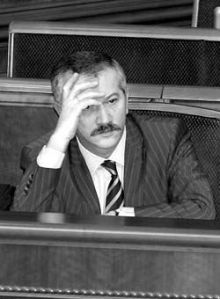On Oct. 20 the Verkhovna Rada of Ukraine rejected the conclusions and proposals of its budget committee for the government’s 2006 draft state budget as well as the draft itself.
After the vote, with 306 MPs in favor, including the Reforms and Order party, the draft budget was sent back to the Cabinet of Ministers for additional work with instructions to consider — together with a high-profile committee — the conclusions and proposals that had been submitted by deputies. Parliamentary Speaker Lytvyn’s People’s Party faction ended up in the minority and lost this stage of the “budget battle.” By all accounts, they failed to make a deal about joint actions with the Party of Regions and the Social Democrats, which was to be expected, since these factions had adopted the same stance on the Kryvorizhstal steel mill issue.
Meanwhile, Lytvyn made a significant statement before the beginning of the debate. Emphasizing the fact that parliament must pass a resolution on the 2006 state budget without deferring this decision until the parliamentary elections, he claimed there was a “budget obstruction scenario.” “The idea is to win the elections and then pass a budget suitable for those who have won the elections, not for Ukraine,” the speaker said. Lytvyn positioned himself as an obvious supporter of the budgetary committee’s rejected conclusions and proposals. It turned out, however, that the speaker’s parliamentary resources are still too meager for him to play an entirely independent role and become a third force capable of marshaling the local elites that are dissatisfied with the central government. It is no accident that the speaker was quoting the decision of the local self-government consultative board (under his control) which states that the draft budget is unacceptable. Meanwhile, People’s Party faction member Lyudmyla Suprun called for a “critical assessment of this bill” and noted that in 2006 some regions will have to spend 90.8 percent of their local budgets on wages and will therefore run short of 17 to 50 percent of funds needed for social and other kinds of expenditures. She suggested bringing the budget deficit to 3 percent, as is the case in Europe.
It seems that this very demand, reflecting the claims (14 billion hryvnias) of the Agrarians whose votes the People’s Party is trying to enlist in the elections, is the one that annoyed both the government and the Party of Regions whose leaders are offended by the lack of attention to their electorate.







